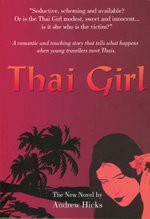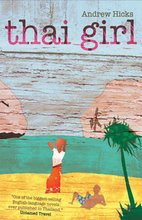
A new monk and a new motorbike
Before the loy kratong festival at the end of the rains when romantic floats of banana leaf called kratons are launched on rivers and waterways at night to carry away the past year’s sins, there always seems to be a media frenzy in the newspapers about teenage sex. For some obscure reason it’s become fashionable for young and very young lovers to surrender their virginity on festivals such as Valentine’s Day and loy kratong. As they can’t do it at home, the ‘love hotels’ you see everywhere in Thailand are booked solid during these festivals.
Some time ago, the newspapers reported a survey that on Valentine’s night in Bangkok, a hundred thousand youngsters from fifteen to twenty four would be at it like rabbits, quoting Bim and Noot (real names withheld) who say there’ll be red roses for them too that night. I’m sure their readers love all this, tutting loudly, and obviously it sells newspapers.
Thai governments, as everywhere, like to respond to newsworthy social problems by being seen to be doing something, but in this case, what exactly should they do? Well, why not go to the love hotels and shame the kiddies by shining torches in their faces when they check in for the night. Yes, that was the cunning plan to preserve their morality that was dreamed up by then Minister of Social Development and Human Security, Watana Muangsook. I wasn’t sure though was who exactly was going to do the shining.
Unhappy to lose the limelight, Khun Watana soon went public again, announcing his view that women should always ‘prostrate themselves at their husband’s feet before bedtime, in line with Thai tradition.’ (The Nation, 14 November 2005.) Well, that’s a great idea too, though if this bizarre tradition ever did exist, its aim was surely the propagation of the nation. More widely observed, it’d make a hundred thousand hits a night seem small beer.
Not surprisingly, womens’ groups complained to then prime minister Thaksin Shinawatra, that promoting marital prostration fosters gender inequality and doesn’t answer any real problems in society. To this he curtly replied that the minister was within his rights to make suggestions on how to improve public morality among Thais.
It seems that the wider problem of under-aged sex and promiscuity among school kids has been causing many twisted knickers. It’s a topic that regularly surfaces in the press and my days have been enlivened by the pronouncements of the secretary to the Minister of Education on matters of sex education, Khun Tossaporn. A while back, The Nation quoted Tossaporn as saying that low-waist trousers and tight shirts are a risqué fashion trend which arouses sexual desire and possibly leads to sex crimes. (‘Ministry hits out at erotic trousers’, 12 February 2005.)
The Director General of the Religious Affairs Department, one Preecha, also urged girls not to wear sphagetti strap blouses and naval-revealing (sic) tops on a religious festival and feared a ‘moral recession’ among young people. (The Nation, 22 February 2005). It’s no laughing matter of course and child protection activist, Senator Wallop added to the debate by saying that ‘the government must be serious in its efforts to suppress illegal businesses and prurient enticements’. (Crisis predicted for middle class kids, The Nation, 13 February 2006.)
Another campaigner also called Wallop, then a university counselor, is quoted as regretting the ban on caning in schools, saying that in the US similar bans have resulted in rising crime rates. ‘Many students,’ he said, ‘became gangsters and killers and indulged in other anti-social behaviour. And all this because they had been raised without caning.’ (Learning Post, 4 April 2006.) Wallop by name…!
The overwhelming concern of older people in Thailand seems to be that youngsters are getting it much younger and more often than they ever did and that’s not a good thing, now is it. All this arousal! It’s not in accordance with Thai tradition anyway.
The newspapers reveal a peculiar mix of salaciousness and prudery that contrasts strongly with ordinary Thais’ easy and exuberant attitude to sex. Like everywhere of course, readers enjoy a little titillation in the papers, but publicly say they disapprove. The Nation reports a survey of readers’ attitudes to naughty stories in the papers which was conducted by a certain Professor Sukhum.
‘The headlines for stories on rape cases were found to capture readers’ attention the most,’ he reports, ‘followed by those on sexual violence, domestic violence and abortion stories. After reading the front page reports, the respondents said they thought women’s revealing outfits are the major cause of rape, pornographic media is the cause of sexual violence, mental disorder the cause of homosexuality, and immorality the cause of child dumping or abortion.’ Would that life was so simple!
In contrast, The Thai Youth Network Against Aids has had the forward thinking idea of getting students to sell condoms to each other. To remove the embarrassment of having to ask for condoms in shops, this would usefully promote safe sex, said their representative, one Wangkanok, (The Nation, 11 February 2006). However, the article cited more opposition that support for the idea. ‘It’s dangerous,’ said one childrens’ rights activist stridently.
There’s even been mention in the Bangkok newspapers of ED or erectile dysfunction, formerly known as impotence. A leading ‘sexpert’ and psychiatrist, Dr Sukamon Wipaweeponkul suggests that oral medication can be a successful remedy (Bangkok Post, 31 March 2006). However, he recommends that ‘doctors encourage ED medication for home use only’, spoil sport that he is! What should it say on the bottle then? “Not for use in Nana Plaza”?
In Isaan at least, there’s a strong tradition for early childbirth soon after puberty. In a peasant farming community, it’s inevitable that as soon as you can, you must breed the next generation. I often meet mothers here in Surin who seem little older than their children and I hear many anecdotes of early teenage marriages in my wife’s parents’ generation. There’s probably no proof, but while today’s school kids still do get pregnant all too often, this may be happening later and later. As water flows down hill, the sexually mature will have sex, but with universal education, early pregnancies should become rarer in the villages of Thailand.
Visitors to Thailand are often perplexed by the openness of commercial sex here in contrast to the modest behaviour of Thai women like Fon in my novel, “Thai Girl”. The two extremes are so very apparent.
In Thailand, it seems there’s a strand of opinion that you’re either a virgin or a whore, so that once you’ve lost your virginity, there’s no going back. As you’re now a whore, you might as well make the most of it and have a good time. Developing a modern concept of responsible and safe sex, is thus one of the challenges for Thailand, which is not helped by politicians brandishing bogus assertions of traditional moral standards.
Sexual behaviour is an important issue for government, if only as a matter of public health, but I fear that shining torches in kids’ faces is doomed to failure, just as equating abstention with public ‘morality’ is a dead duck. In any case I’m not sure that the idea of sexual purity has ever been a part of Thai thinking. The Thais have an open and natural attitude to sex, free of the guilt complexes engendered by repressive Christian teaching. Thus, if a man can support a woman he likes, then he’d better have her and others too if he can afford them. In any event, things have moved on in recent decades and the risk of fatherless babies should be minimised if governments successfully promote responsible safe sex and contraception.
My own take is that the idea of strict abstinence for unmarried women is more a Chinese than a Thai attitude. Bangkok in many respects is a Chinese city and those in government and other positions of influence retain Chinese ways of thinking. Thus a daughter must be kept pure and unsullied as in due course she will become the possession of her husband. The loss of virginity is more about property and the family’s chances of a good bride price than it is about moral purity in the Christian sense.
It’s common for Thai advocates of abstinence to blame ‘westernisation’ for the perceived moral decline and promiscuity of their young, but again this is wishful thinking. If sex is happening earlier, which isn’t necessarily true, it’s happening for the same reasons as in the West and not only because the West showed the way. Contraception makes strict abstinence unnecessary and the fragmentation of the extended family and urbanization leave people much freer to do what they like. In any event, Thai television and advertising are full of sexualized images that successfully seduce the young into early sex, without any help from the West.
Let’s face it, even if virginity in women is valued in Thailand, men here have always been allowed to do pretty much what they want. This double standard again suggests the irrelevance of ‘morality’ and that virginity in women has traditionally been important simply to avoid unwanted pregnancy and to secure a good marriage and bride price.
But nothing ever stays the same. To quote Bob Dylan, ‘the times they are a changing,’ and the Minister for Modern Morality, whoever that might now be, had ‘better start swimming or he’ll sink like a stone’. Someone should tell him that water always flows downhill and that promoting abstinence is hopeless. It’s as unrealistic as the story of the little Dutch boy who, when the floods threatened the town, was resourceful enough to stick a finger into the hole in the dyke.





No comments:
Post a Comment